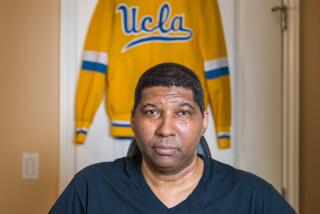Game Enhances Watson’s Life : Athletics: He has renewed energy and a sense of purpose after learning about wheelchair tennis.
IRVINE — Mike Watson had just lost in straight sets, congratulated his tennis opponent and moved toward the sideline. No excuses, no visible signs of disappointment with his play. Not even one complaint about a line call.
Nothing but a smile, and his words about the enjoyment he finds in competition. But, after all, he had won the mixed doubles championship earlier in the tournament with Sharon Clark of San Francisco, and he still was feeling good about that.
The scene was the U.S. Open Wheelchair Tennis Championships at the Racquet Club of Irvine, and Watson stood out as an ambassador for this sport and this event. Before he became involved in wheelchair tennis about 14 years ago, Watson was struggling emotionally. “I really didn’t have a life then,” he said.
It had been that way for about 16 years after the automobile accident. Watson was 18 the night it happened, just a few weeks before his graduation day at Tustin High. He and three friends were riding in a car that crashed on Red Hill Avenue in Tustin. One friend died; Watson’s spinal cord was severed, leaving him paralyzed from the chest down.
It is almost 30 years later now. Watson, 48, lives in Irvine and wheelchair tennis has helped change his outlook on life. “I’m a very happy person now,” he said. “I’m able to travel, see my friends and meet new people playing tennis.”
But there was that terrible, inexorable despair before things finally got better.
“I was in and out of hospitals for three years,” Watson said. The low point was about a year after the accident. “At that stage, I just didn’t care anymore,” he said. “I didn’t want to see anyone. I wasn’t eating, and I’d gotten so weak they had to come into my hospital room to turn me. I couldn’t even push up with my arms.”
Watson decided then he was going to die if his attitude didn’t change, and he began the long and difficult emotional struggle back, fighting depression every step of the way.
“I went back to school, got a degree in engineering at Western Tech and took a job at Rockwell International for a couple of years, but I still didn’t feel I had a life and was always looking for something else,” he said. “For several years, I did a lot of different things . . . anything where I didn’t have to punch a time card.”
Life was even more difficult for a person using a wheelchair in the 1960s, Watson recalled. “When you went out to dinner, you had to go in through the kitchen in most places because there wasn’t any easy access for you at the front door,” he said. “It wasn’t easy to travel then on airlines, either. There were a lot barriers then that have been changed now. And Irvine is one of the most progressive cities in the country from that standpoint.”
Watson tried his hand at photography for a while, and a high school friend helped him revamp a dune buggy so he could control it with his hands. He found enjoyment for a while driving that in the desert, but he stopped after a mishap gave him second thoughts about his safety.
“We were playing follow the leader, and I went into a deep sand bowl in the desert near Mexicali, and the dune buggy turned over on its side when I was trying to get out,” he said.
But the real turning point, he said, was when he decided to do some physical training. “I started working out at Orange Coast College and I met another guy in a wheelchair who asked me if I played tennis,” he said. “I didn’t believe him. I had never heard of playing tennis in a wheelchair.”
Not long afterward, Watson met Brad Parks, whose injury in a 1976 snow skiing accident had made him paraplegic. Parks was teaching wheelchair tennis, and Watson quickly embraced the sport. “I found I could hit the ball fairly well from the wheelchair from the beginning,” he said.
In high school, Watson had played linebacker and offensive tackle in football. “I lived for football when I was in high school,” he said. “I had always been very sports-minded. I think I could have played in college if I had the chance.”
Watson began teaching wheelchair tennis at various community centers and schools, funded initially by a grant from the U.S. Olympic Committee to the National Foundation of Wheelchair Tennis that Parks founded in San Clemente.
That money ran out in 1989 after about four years, but Watson still teaches an adult class at Irvine Valley College, and is giving private lessons to five others. One is Mark TerBorg, an Irvine resident who suffered severe head injuries when he was beaten in a Tampa, Fla., mugging four years ago. Those injuries left him paralyzed on the right side and unable to speak intelligibly.
His younger sister, Tawny, went looking for someone to help her brother play tennis again two years ago. She found Watson.
“Mark had been a very good tennis player before, and I wanted him to be able to play again,” Tawny TerBorg said. “The doctors didn’t think he’d live, and today he’s back playing tennis. He started out in the wheelchair, and now he’s able to stand stationary and hit.
“Mike has been wonderful. He doesn’t believe in the word ‘impossible’ and he has a great ability to help people come to terms with where they are and what they can do to progress.” In addition to teaching, Watson enjoys the travel and the camaraderie connected to playing in wheelchair tournaments. He plays in virtually every division: B-level singles, doubles, mixed doubles and the masters level for players 40 and over.
“Tennis is really a social game, and it’s a great opportunity to meet people,” he said. “And a wheelchair player can play singles with an able-bodied player, or in doubles with another wheelchair player and two able-bodied players. The only difference is that the wheelchair player gets to hit the ball on the second bounce.”
Clark, who has been his mixed doubles partner for three years, says Watson got her going in competitive tennis about four years ago and coached her when she was starting out.
“He’s one of those guys who always has time for you,” she said. “He took my game from the beginning level to the intermediate level in just one year. He’s great to play doubles with, too, because nothing ever bothers him. This year we were in a tiebreaker in the third set of the finals and I said, ‘You’re not going to get mad at me if I hit the ball out are you?’ He said something like, ‘The only thing I care about is that you have fun.’ ”
Watson has come a long way since those days of despondency.
He is outside in the bright Southern California sun, playing a game he enjoys. “I really like the competition, and to win,” he said, smiling. “But I’m out there now to have fun more than anything else.”
More to Read
Go beyond the scoreboard
Get the latest on L.A.'s teams in the daily Sports Report newsletter.
You may occasionally receive promotional content from the Los Angeles Times.










